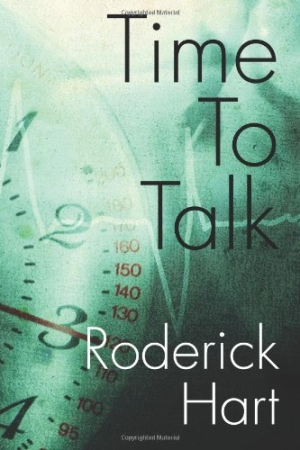It looks like you've stumbled upon a page meant to be read by our code instead of viewed directly. You're probably looking for this page.
Time To Talk
Time To Talk is a charming and unpredictable story laden with quirky characters and sharp, playful writing.
Poet and artistic adventurer Roderick Hart’s debut novel is a skillfully crafted and humorous exploration of the limitations of artifice and the importance of sincere human interactions, interwoven with a tale of intrigue for an intellectual crowd.
Maxwell Anderson discovered early on that his social awkwardness came with an upside: it rendered him a naturally skilled listener. Now somewhat a chameleon by trade, he has set up shop as an unlicensed psychologist, taking over studio space in an artist’s collective in Edinburgh.
Max’s clients are a varied bunch, among them an amateur biblicist obsessed with the idea of divine perfection and a professor with book-hoarding tendencies. Max runs into no significant problems fielding their neuroses until one client, a man dismayed by his inability to dream, ingests psychotropic drugs and gets himself hit by a car.
Suddenly, Max is the subject of a police investigation led by an overzealous detective who latches onto Max’s lack of credentials. Faith, Max’s comely new girlfriend, uses her access as a college librarian to help him mount a defense in the detective’s looming court case. More importantly, she guides Max into the sort of intimate human connections he’s avoided his whole life.
The novel moves at a steady and involving pace, piquing and holding reader interest. Max is a self-reflective and inwardly amusing narrator, given to wry reflections on his circumstances and frank, if unapologetic, summations of his various deceptions—“the fact that people have letters after their name is no guarantee of civilised behaviour,” he notes of one client’s more degreed colleagues.
Hart’s diction is both earthy and direct. Metaphorical writing abounds, and most manages to be fresh, surprising, and evocative. “[A]ny happiness not rooted in…reality is froth on the beer without the body to support it,” Max reflects on one page, while on another he observes that his companion’s stubble is not the designer sort, but makes him look as though “he’d slept in his raincoat.”
While the wide array of characters could easily overwhelm these pages, readers may instead find the quirky members of the collective—from haughty Ceramick, an “Irish” clayworker, to the ever-helpful Janice—add color, particularly prior to the arrival of Faith, whose presence enlivens introspective Max. While Hart could turn any of these characters into caricatures, they continually manage to surprise. Even Faith, the winsome librarian, never sidles too closely to available tropes.
Though Max faces very real legal consequences for his misrepresentations, the central conflict manages to tie up neatly and quickly. The novel comes to seem less about comeuppances than about growing up. Max is forced out of his assumed roles by chance, and moves into a more social life by luck.
A charming and unpredictable story laden with quirky characters and sharp, playful writing, Time To Talk proves to be both a fun and thought-provoking read.
Reviewed by
Michelle Anne Schingler
Disclosure: This article is not an endorsement, but a review. The publisher of this book provided free copies of the book and paid a small fee to have their book reviewed by a professional reviewer. Foreword Reviews and Clarion Reviews make no guarantee that the publisher will receive a positive review. Foreword Magazine, Inc. is disclosing this in accordance with the Federal Trade Commission’s 16 CFR, Part 255.
